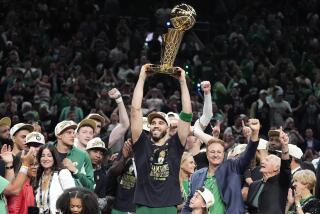Celtics Should Be Playing Better Than .500 Team and They Know It
- Share via
BOSTON — The Celtics were23-23, right in the middle of the proverbial pack at the All-Star break.
It is exactly where they belong.
They are neither very good nor very bad, though they have shown a greater inclination to descend to the latter than ascend to the former.
They are awful on the road (5-15), average at home (18-8), woeful when trying to rally (1-17 when not leading after three quarters) and reasonably successful protecting fourth-quarter leads (22-6 in games in which they lead after three).
They have been competitive -- 14 of their 23 defeats have been by nine points or fewer -- and they are a big improvement over recent Celtics’ teams in two areas: rebounding and turnovers.
They have not fallen through a dead spot in the parquet floor after Larry Bird went down for the four-month count. Neither did they collectively elevate their game to prove they could prosper without No. 33. And with four so-called All-Stars on the roster, that has to be a disappointment. They should be better than 23-23 and they know it.
The season has been one of almost unending adjustment. New Coach Jimmy Rodgers has tried to reacquaint the team to the running game. He has had little success there. Because of injuries, experiments and other factors, Rodgers has employed 11 starting lineups.
The coach has blended youth into the picture and has shown patience as the players learn the ways of the NBA. However, his preseason vow to cut down on the minutes of the elder statesmen hasn’t been carried out, particularly in the case of Robert Parish.
In the preseason preview on the Celtics, we listed six potential trouble areas for the team. One of them, an over-reliance on Bird’s scoring, is not applicable. The other five are as valid now as they were then.
No rest for Robert: This is as compelling an issue now as it was before the season. And back then, that’s what everyone seemed most concerned about. And all Parish has done is defy logic, having arguably his best season and averaging 36.8 minutes and playing in all 46 games. Can he keep it up? The Chief maintains he can. He came into camp expecting to play many minutes (if maintained, the 36.8 mpg would be his second highest). With only Mark Acres as a replacement, there seems little doubt Parish will continue to pile up the minutes. What has hurt Rodgers’ chances to get more rest for Parish has been: a) the coach’s belief that a victory here or there is worth the sacrifice, and b) the lack of blowouts, either way. Unless the Celtics do something about a backup, look for Parish’s marathon minutes to continue.
Are the kids really all right?: Without question, the biggest disappointment of the season is the regression of Brad Lohaus. It’s almost to the point now where he’d have trouble finding the square hole for the square block. His confidence is shattered, the coaching staff wonders if he’s an NBA-caliber player and he seems uncomfortable in whatever role he is asked to perform. After last season, this is indeed a crusher. The Celtics need more, much more from him, but it may be they won’t get it because he can’t give it to them. Reggie Lewis is the flip side of Lohaus. He has taken advantage of the opportunities presented to him and now represents a legitimate scoring force. His defense is still suspect, but he is a diligent worker with an ideal temperament. The one question is what happens to him when Bird returns? Brian Shaw tilts much more toward the Lewis end than the Lohaus end. Rodgers has done the wise thing and inserted him as a starter. And the coach did the wise thing Wednesday and let Shaw finish the game; the team isn’t so predictable with him out there. One inescapable conclusion: Shaw needs time. Right now, most of his minutes are coming out of Danny Ainge’s pocket rather than Dennis Johnson’s. Since being elevated to the starting lineup, Shaw has averaged a Fat Lever-esque 10.8 points, 7.8 rebounds and six assists and shot 47 percent in games in which he has played at least 30 minutes. In games in which he has gone less than 30 minutes, he averaged four points, 3.8 rebounds, 2.5 assists and shot 32 percent.
Easy baskets: The Celtics haven’t exactly embraced the up-tempo game -- “They don’t like to run,” said Indy’s Reggie Miller -- which is one reason (along with the absence of the creative Bird) that they lead the league in fewest turnovers committed. And much of their futility in the fourth quarter is because of lack of movement, with or without the ball. But they are getting more easy hoops thanks to a vast improvement in offensive rebounding and more pressure on defense in selected spots. Boston was last in offensive rebounding last season. It is sixth this season. Boston was last in forcing turnovers last season. It is 21st this season. The Celtics lead the league in overall rebounding and, for the past three years, the top rebounding team has averaged 49 victories.
The Great Expectations Jinx: This jinx has changed from the pressure on Rodgers to the pressure on the team to pull a 180-degree turn when Bird returns. Bird’s injury has eliminated much of the public pressure. If they were 23-23 with Bird healthy, that would be a different story. No one is talking about division flags or championships now. But the big mistake many might be making (including the front office) is thinking things will automatically turn around when Bird returns.
More to Read
Go beyond the scoreboard
Get the latest on L.A.'s teams in the daily Sports Report newsletter.
You may occasionally receive promotional content from the Los Angeles Times.










